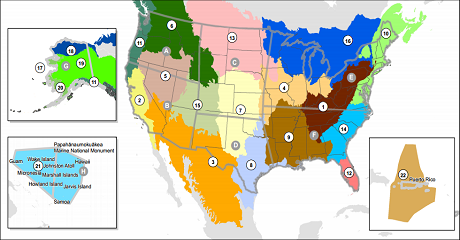-
Upcoming Webinar: Preliminary Results from “La Florida” - A Land of Flowers on a Latitude of Deserts
Please join us for our 2nd webinar in the Spring 2013 "NCCWSC Climate Change Science and Management Webinar Series". The webinar, "Preliminary Results from “La Florida” - A Land of Flowers on a Latitude of Deserts", will be presented by Thomas Smith of the USGS Alaska Science Center. The presentation will be held on Wednesday, February 27 at 3:30 PM Eastern. For more information or to register, please click here.

-
NCCWSC & CSC Science Projects
Collaboratively, the National Climate Change & Wildlife Science Center (NCCWSC) and the eight Climate Science Centers (CSCs) provide scientific information that natural and cultural resource managers can apply to monitor and adapt to climate and land changes at both regional and local scales. Every year, NCCWSC and the CSCs support numerous science projects throughout the United States that cover a wide array of topics ranging from assessments of the vulnerability of ecological systems in the North Central U.S. and climate-driven changes to vegetation in the Pacific Islands, to the sensitivity of coastal rainforests to changes in glacier runoff in Alaska.

-
Climate Science Centers and the Landscape Conservation Cooperatives
Landscape Conservation Cooperatives (LCCs) are a network of public-private partnerships that bring together managers and scientists for conservation planning and application of science to management and to manage climate risks to natural and cultural resources. Collaboration with the LCCs allows the Climate Science Centers (CSCs) to address high priority regional science needs and deliver necessary scientific information required by resource managers.

-
U.S. Department of the Interior Climate Science Centers
Climate Science Centers (CSCs) function as both regional providers of climate science information and as part of a national network coordinated by NCCWSC. CSCs work with important resource management partners, including Landscape Conservation Cooperatives, to improve understanding of the effects of likely global changes on valued natural and cultural resources. The CSCs are divided into eight regions throughout the United States: Alaska, North Central, Northeast, Northwest, Pacific Islands, South Central, Southeast, and Southwest.
News & Announcements
February 6, 2013: A new website, the Early Career Climate Forum, was recently launched to facilitate collaboration and networking among early career scientists, managers, and others working at the science-management interface on climate change issues.
(Read More...)January 30, 2013: A new report, "Wildlife in a Warming World" was released today from the National Wildlife Federation (NWF).
(Read More...)More Information
NCCWSC Mission
The mission of the USGS National Climate Change and Wildlife Science Center (NCCWSC) is to provide natural resource managers with the scientific tools and information they need to develop and execute management strategies that address the impacts of climate and other ongoing global changes on fish and wildlife and their habitats. Read more..
Climate Science Centers
U.S. Department of the Interior (DOI) Climate Science Centers (CSCs) are managed by NCCWSC and provide scientific support for climate-adaptation across a full range of natural and cultural resources. CSCs prioritize their deliver of fundamental science, data and decision support activities to meet the needs of the Landscape Conservation Cooperatives. Read more...
USGS Climate and Land Use Change
The NCCWSC is part of the Climate and Land Use Change (CLU) mission area of the U.S. Geological Survey. CLU undertakes scientific research to address the effects of climate and land use change on the Nation’s resource and to assist policymakers, natural resource managers, and the public in making informed decisions about the management of natural resources on which they and others depend. Read more...
NCCWSC Webinars
NCCWSC co-sponsors a webinar series to highlight NCCWSC/CSC science projects and to inform scientists, land managers and the public about potential and predicted climate change impacts on fish and wildlife and to guide resource management decisions across the U.S. Read more...
Learn More about the DOI Climate Science Centers
Project Updates
Quantifying Vulnerability of Quaking Aspen Woodlands and Associated Bird Communities to Global Climate Change in the Northern Great Basin
Quaking aspen populations are declining in much of the west due to altered fire regimes, competition with conifers, herbivory, drought, disease, and insect out...
Impacts of Climate-Induced Changes in Plant Phenology on Migration, Breeding, and Redistribution of Sub Arctic- and Arctic- Nesting Avifauna
There is considerable evidence that global climate change has altered the start of spring vegetative growth or green-up and extended the growing season in plan...
Characterization of Spatial and Temporal Variability in Fishes in Response to Climate Change
Currently, there exists much uncertainty regarding how climate change will influence different populations or ecosystems. To improve current understanding and f...
